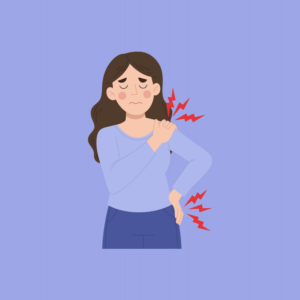
Inflammation is something that comes up quite a lot in clinic. So let’s dive in to learn a little bit more about it, and some ways that we can try to minimise it in our daily lives.
Inflammation is the body’s natural response to protect itself from harm. It involves the activation of immune cells, the release of antibodies, and increased blood flow to the affected area. There are two types of inflammation: acute and chronic. Acute inflammation is short-term and typically resolves once the body has dealt with the offending agent. Chronic inflammation, on the other hand, persists over a longer period and can contribute to various diseases
Some common inflammatory conditions include rheumatoid arthritis, inflammatory bowel diseases such as ulcerative colitis and crohn’s disease, and eczema.
While medication can help manage inflammation, lifestyle changes play a crucial role in reducing chronic inflammation and improving overall health
Things like a good diet, regular exercise, quality sleep, stress management and avoiding known inflammatory activities seem like a no-brainer but these lifestyle changes could literally by life-changing!
Diet
An anti-inflammatory diet is one that is rich with fruits and vegetables, abundant in herbs and spices, includes healthy fats high in omega-3 fatty acids, and priorities whole grains over refined carbs.
Why?
Fruits and Vegetables are rich in antioxidants and nutrients that combat inflammation. Aim for a colorful variety to ensure a broad range of vitamins and minerals.
Spices like turmeric, ginger, garlic, and cinnamon are known for their anti-inflammatory effects(See our previous post about turmeric and inflammation). Incorporate them into your meals regularly.
Omega-3 fatty acids found in fatty fish, flaxseeds, and walnuts have potent anti-inflammatory properties. Olive oil, particularly extra virgin, is also beneficial. If you feel like you are not getting enough omega-3’s in your diet – a good quality fish or flax seed oil supplement can be taken.
Whole grains like brown rice, quinoa, and oats provide more nutrients and fiber, which help reduce inflammation compared to refined grains like white breads and pasta’s which are usually highly processed.
Exercise
Physical activity can help reduce inflammation by lowering levels of inflammatory markers in the body. Aim for at least 30 minutes of moderate exercise, such as walking, swimming, or cycling, most days of the week.
Sleep
Poor sleep can exacerbate inflammation. Aim for 7-9 hours of quality sleep per night. Establish a regular sleep routine and create a restful environment to improve sleep quality.
Stress Management
Stress Management: Chronic stress contributes to inflammation. Practices such as mindfulness, meditation, yoga, deep breathing exercises, and acupuncture can help reduce stress and its inflammatory impact.
Avoid things that cause inflammation: processed foods, smoking/vaping and excessive drinking all trigger inflammation in the body.
Liah Tsotros
Practitioner of Traditional Chinese Medicine





